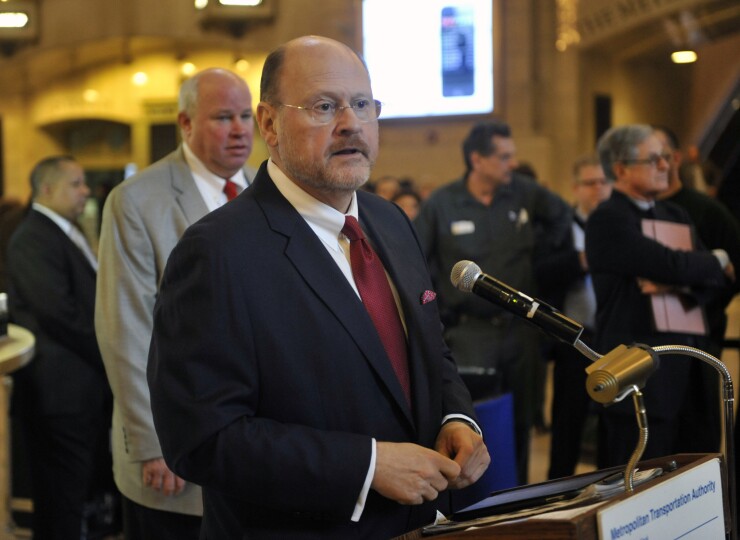Joseph Lhota will return to New York’s crisis-ridden Metropolitan Transportation Authority as its board chairman, Gov. Andrew Cuomo announced late Wednesday night.
Lhota was the MTA’s board chairman and chief executive from 2011 to 2012 until he resigned to run for New York mayor. A Republican, he lost the general election to Democrat Bill de Blasio. Lhota was also deputy mayor for operations in Rudolph Giuliani’s administration.
As chairman, Lhota will receive a nominal salary of $1 per year, and delegate CEO duties to a permanent executive officer, a position for which the search is ongoing. Ronnie Hakim is the interim executive director.

Lhota will continue as senior vice president, vice dean and chief of staff at NYU Langone Medical Center.
"This is an incredibly challenging time for the MTA and we will immediately and aggressively tackle the problems the system is facing after decades of disinvestment," Lhota said in a statement.
The MTA, New York’s transit system operator and a large municipal issuer with nearly $38 billion in debt, has become synonymous with breakdowns and delays that have triggered apologies, reviews, contingencies and even a creativity “genius contest” scheduled to begin with a June 29 conference at City College of New York.
"There is much hard work to be done to address the MTA’s current failures," said Cuomo.
During a week that included long delays on multiple subway lines due to a switching interlocking system failure – two riders, alarmingly, left their stalled Manhattan train in mid-tunnel, risking electrocution, to walk to the nearest station – Cuomo on Tuesday unleashed a barrage of invective at the MTA and called for even tighter control of the agency through a bill that would add two extra state-appointed board seats.
“The bureaucracy is dysfunctional,” he said. “On the Second Avenue subway project, for example, the MTA was floundering.”
The MTA also operates the city’s buses, Long Island Rail Road and Metro-North Railroad commuter lines and several bridges and tunnels.
Critics say Cuomo has ample control already and governance structure is not the problem.
“Every serious observer knows [it’s] not actually the barrier to improving public transit,” said John Raskin, executive director of the Riders Alliance lobbying group.
“Any path to fixing our subway system begins with Gov. Cuomo putting forth a credible plan for how to upgrade MTA equipment, improve MTA operations and institute a fair and sustainable funding source to make it work.”
Six of the 14 voting seats on the board are now gubernatorial appointments, giving Cuomo a plurality, though not a majority. Many board votes on actions items pass unanimously.
Predating Cuomo’s administration, New York State has frequently underfunded mass transit and in recent years, has raided lockbox transit accounts periodically to balance its general fund.
Headaches for commuters are bound to worsen in three weeks when Amtrak’s emergency track maintenance around Penn Station will force track shutdowns that will affect Amtrak, LIRR and New Jersey Transit riders.
Cuomo’s take-charge ways over the past two years have elicited praise for stepping up amid crisis and scorn for micromanaging.
“He’s probably a little of both, and that’s not inconsistent,” said Philip Howard, founder and chairman of the nonprofit Common Good. “The person who wants to speed along the Tappan Zee Bridge is also the person who says ‘I want to look at that lane extension.’”
Board members behind the scenes have discussed Cuomo’s reach – or overreach, depending upon perspective. At Wednesday’s monthly meeting, it came to the forefront.
“We as a board are neutered from making decisions as a public benefit corporation,” said Veronica Vanterpool, a de Blasio appointee.
“We have not been able to make some key decisions. Many appointments and announcements now are coming out of the governor’s office,” said Vanterpool, the executive director of the Tri-State Transportation Campaign, a 501(c)(3) nonprofit advocacy group. “We are not seeing the level of control that we had seen before, and that is a significant issue.”
Vanterpool said she attended a recent transit conference -- “about 12 different systems” – and all their boards hired a CEO or general manager. About 75% of them, she said, appoint their chairman.
“We don’t do either,” she said.





